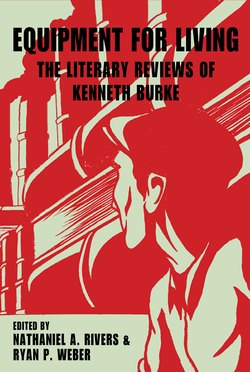Читать книгу Equipment for Living - Kenneth Burke - Страница 8
На сайте Литреса книга снята с продажи.
ОглавлениеDeposing the Love of the Lord
Selected Religious Poems of Solomon Ibn Gabirol. Translated into English Verse by Israel Zangwill. Edited by Israel Davidson. The Jewish Publication Society of America.
The Dial, August 1924, 161–162
On reading through this collection of devotional poetry, the reader must first of all be impressed by the constancy of the subject-matter. Here the poet keeps his eye focused long and lovingly on one thing, which is God and His Creation. But there is also a certain deadly disproportion here: it seems that in spite of his prolonged focus, Gabirol had not succeeded in finding an eloquence equal to his engrossment. The first inclination is to lay this discrepancy to the translator; it is appalling to sit down and translate an entire book of verse, and it would be readily pardonable if that imaginative inventiveness which is the best communicant of conviction—if not the proof of it—were found missing in the result. For too often Gabirol assures us rather than persuades; loving the Lord, he deposes accordingly. It is a record without pungency; at least if one is allowed to examine churchly texts for their sheer cunning of diction, boldness of image, for the picturesqueness of their passion, in short, rather than for its honesty.
But in Mr. Davidson’s introduction to this volume there is material which justifies us in laying this skepticism against the original rather than the translation. For Gabirol wrote his religious poems at a time when it was the accepted thing to write religious poems, or, as the Rev. Matthew Henry says of Nehemiah, wrote “where religion was in fashion, and an air of it appeared on men’s common conversation.” Gabirol wrote “according to the genius of the place,” and the genius happened to be one of piety—and while this does not in any way invalidate the sincerity of his poems, it does justify us in laying less importance upon his religious engrossment than we might have done otherwise. Especially since we are told the additional fact that if the devotional lyric was in vogue, it was Gabirol who contributed most to breaking down this vogue, as he was perhaps the first writer of secular Hebrew verse. “Where religion was in fashion,” then, Gabirol inaugurated a profane tradition, which indicates that his engrossment in the Lord was by no means a complete thing with him, and may explain our feeling that Gabirol, in his proper business of recalling that Vast Gulf between Self and Maker, conveys less to us of God’s greatness than of his own smallness.
On the whole, the poems in unrhymed translation are much the better, and this is especially true of the long closing rhapsody where the original, we learn from Mr. Zangwill, was rhymed, but very freely and irregularly; perhaps poet and translator both have profited by this greater liberty. This, for instance, has something of the true Biblical ellipsis:
Calling unto the void and it was cleft,
And unto existence and it was urged,
And unto the universe and it was spread out.
In this poem Gabirol could become eloquent over the astronomy of his day. And perhaps one explanation of the paleness in most of his poems is that too often he was accepting the fashion of praising the anthropomorphic Creator, whereas in reality he already had the modern touch of being more interested in the Creation. In any case, it is only when he starts moving among the astral bodies that we get any sense of splendor in his faith. For the documents of his religious fervor seldom flower. The great bulk of his lines are at best neutral; they are the mere labels of religious experience, the signs without the persuasion, the typical rather than the excellent.
One might draw a moral: The poet must possess the whole sincerity of his subject if he is to produce art, and the poet must have something beyond sincerity to produce art. The art-emotion transcends the emotion of his subject-matter. Beginning with engrossment in his material, the artist hunts the means to his expression, and these means in turn become hypertrophied into an aim of themselves. But both steps are equally necessary, for the invention of means is the result of engrossment in the material. With Gabirol there was no invention to become hypertrophied; the result is documentary truth without persuasion.
